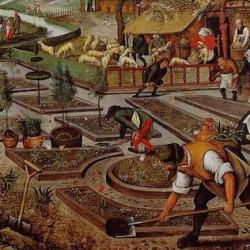Ancient conceptions of society were tinged by the potential for tragedy, a potential linked to the inescapable necessity of alterity, of encountering an “other.” As Luigino Bruni puts it (The Wound and the Blessing), “if happiness requires social relationships—that is, requires friendship and reciprocity—if friendship and reciprocity are free acts neither fully nor unilaterally controlled by the individual, then human happiness depends on the response of others, on how much they return love, friendship, and reciprocity. If . . . I need friends and reciprocity to be happy, then the happy life is ambivalent: the other is my joy and sorrow, my only chance for true happiness, but also the one on whom my unhappiness depends” (5).
Aristotle’s conception of friendship is partly a response to this dilemma. Friends have to be carefully selected, and they are chosen from a pre-selected stock of potential friends, all of whom are male, adult, free. Though friendship involves encounter with an “other,” the encounter is “diversity among similars.” Friends “seek a commonality among themselves in which the ‘not’ that separates and wounds does not enter; there is no alterity” (8). As the social setting for friendship, the polis is a mediator of non-wounding friendships.
The polis is the magic place where the hierarchies of the smaller societies that constitute it (marriage, family, village) are resolved into pure equality. The polis is the mediator that enables the blessed community: Because each citizens belongs to the state, their relations with one another are not direct relations of power but can be free relations among equals.
Medieval society, Bruni argues, shifted mediation to “the Absolute,” to God: “I need not enter into deep relationship with you to be happy; my happiness emerges from my relationship with the Absolute, with God” (9). God takes the place of the polis as the mediator of relationships, who stands between to buffer the one from the other.
Modern social order and social science dispenses with the Absolute mediator. Modernity discovers the “not” of otherness: “Modern humanity has seen primarily the wound, rather than the blessing, of the other” (10). The other inhibits my freedom and happiness. Modern society is thus structured not according to a principle of communitas, but of immunitas, an order that enables us to keep safe distance from one another.
Yet this doesn’t involve the elimination of mediators as such. Rather, modernity forms substitute mediators, to replace the medieval God who served as mediator and seal of human relations: “Hobbes with Leviathan and Smith with the ‘Invisible Hand’ of the market sought a replacement for the Absolute as the mediator of the I-Thou relationship. . . . In Hobbes’s politics and Smith’s economics there is no direct intersubjectivity, but rather a mediated and anonymous relationality, for fear of the negative and suffering that a personal ‘you’ carries in him- or herself. the contract—private for Smith, social for Hobbes—thus became the main instrument of this interaction, where the ‘contract is above all that which is not a gift, but the absence of munus‘” (11, quoting Roberto Esposito). A “gift bring us together since it requires that we find a common ground that, by definition, belongs to neither of us, whereas the contract makes us immune from each other since what is mine is not yours, and vice-versa” (13). Gifts continue to be exchanged, but they are confined to a private world that, more or less, tolerates the hierarchies of benevolence and reception. But gifts cannot be constitutive of public life or the market.
This comes to extreme expression in Rawls’s requirement that the social contract arise from “mutual disinterest.” Rawls’s veil of ignorance deliberately excludes “feelings, a sense of belonging, friendship and strong bonds” from the foundations of social order, since they are “dangerous, ever tending to ward partiality and exclusivity.” Justice or fairness requires “individuals without ties and passions” (13). But what is expressed with manic consistency in Rawls is the founding assumption of “the grand ‘immunizing’ project of modernity” (13).











